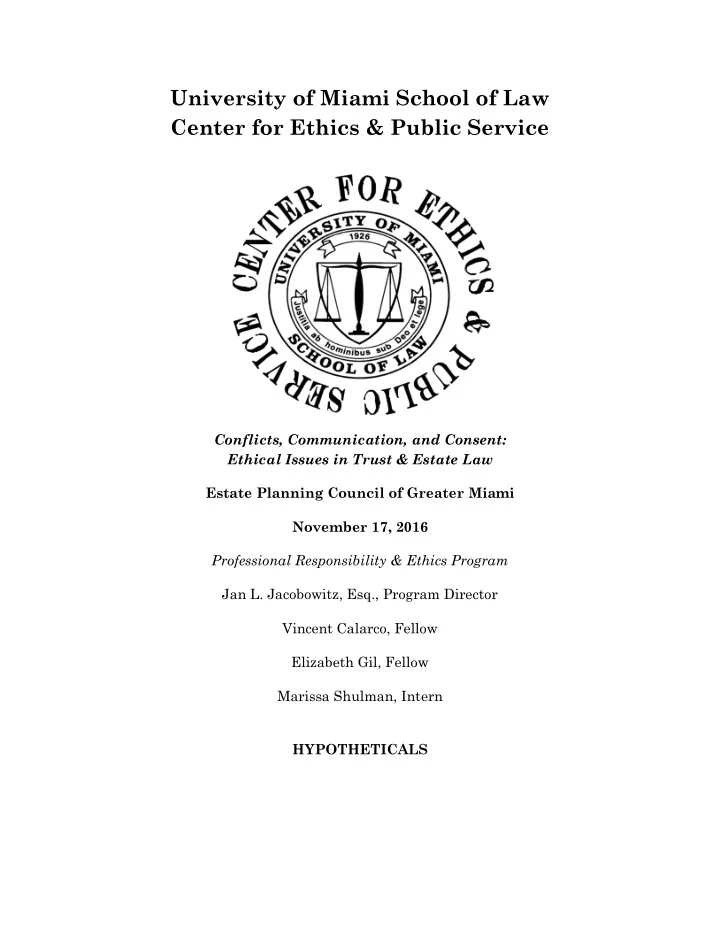

University of Miami School of Law Center for Ethics & Public Service Conflicts, Communication, and Consent: Ethical Issues in Trust & Estate Law Estate Planning Council of Greater Miami November 17, 2016 Professional Responsibility & Ethics Program Jan L. Jacobowitz, Esq., Program Director Vincent Calarco, Fellow Elizabeth Gil, Fellow Marissa Shulman, Intern HYPOTHETICALS
Act I: Better a Witty Fool than a Foolish Lawyer Juliet is a lawyer and serves as the personal representative for her father, Lord Capulet’s estate and as attorney in fact for her mother , Lady Capulet, who is the sole beneficiary of Lord Capulet’s estate. Juliet takes $400,000 from Lord Capulet’ s estate to invest in four real estate properties: two in Tuscany, Florida and two in Rome, Florida. The properties are purchased in the name of Venice Properties, a corporation established and managed by Juliet. Venice Properties ultimately transfers one of the properties to Juliet. She uses it as collateral for a personal loan. Rather than have the property vacant, she invites one of her clients who is struggling in a divorce case to live in the property at a reduced rent. Eventually, Juliet sells the properties and pays $350,000 back to the estate. When asked about the other $50,000, she explains that it was used to pay some of Lady Capulet’s bills. There is no documentation in the estate that either establishes the terms of the initial $400,000 deductio n from the estate’s account or the use of the $50,000 that was not returned to the estate’s account. What are the ethical implications of: 1. Juliet using money from Capulet’s estate to invest in four real estate properties? 2. Juliet allowing a client to reside in one of the properties at a reduced rent? 3. Juliet’s lack of documentation to memorialize the personal loan and the unaccounted $50,000? 1
Act II: To Gift or Not to Gift? Ophelia and Hamlet have been friends since their first year in law school. They have been practicing estate planning in Florida since graduating — Ophelia is a solo practitioner and Hamlet works at a big law firm. Recently, they have been involved in different situations relating to gifts from their clients. A) Ophelia has been asked to draft a will for her widowed mother, who wants Ophelia to receive two- thirds of the estate and Ophelia’s other two siblings to split the remaining one-third. Ophelia has advised her mother to consult independent counsel but her mother refuses. She breaks down sobbing and implores Ophelia to draft the will. Ophelia complies and drafts a simple will for her mother. Questions for Ophelia 1. What are the ethical implications of Ophelia’s behavior? 2. What are some possible consequences of Ophelia’s actions? B) Hamlet has had a close relationship with his elderly client, Claudius, for 20 years. Hamlet knows that Claudius is estranged from his family and understands why Claudius no longer wants his family members to be beneficiaries of his estate. Hamlet asks an associate at his firm to draft the will based on his notes for asset distribution. Claudius indicates that he wants to leave his entire estate to Hamlet. Claudius signs an agreement waiving any conflict of interest and his rights under Florida Statute §732.806. Although Claudius appears a bit confused when he executes the will, he profusely thanks the associate and Hamlet, presenting them with VIP tickets to an upcoming Heat game as a token of his appreciation. Questions for Hamlet 1. What are the ethical implications of Hamlet’s behavior? 2. What are some possible consequences of Hamlet’s actions? 2
Act III: I Trust That is Not Okay Romeo has been Juliet’s attorney for years. Through his excellent lawyering and proven analytical ability, he has earned the trust of Juliet. Juliet asks Romeo to draft a revocable trust, and Romeo obliges. However, Juliet is unsure about who should serve as her trustee. Romeo offers to serve as her trustee. Juliet agrees to the appointment. Romeo includes an exculpatory clause that greatly limits his liability as her trustee. Romeo does not mention the clause to Juliet. He also includes in the trust a provision giving him veto power over the naming of any successor trustee. Juliet signs the trust based upon her confidence in Romeo and does not ask for an explanation of any of the provisions of the trust. What are the ethical implications of the following: 1. Romeo suggesting that he become Juliet’s trustee? 2. The exculpatory clause in the trust? 3. The veto power provision in the trust? 4. Juliet’s execution of the trust? 3
Recommend
More recommend